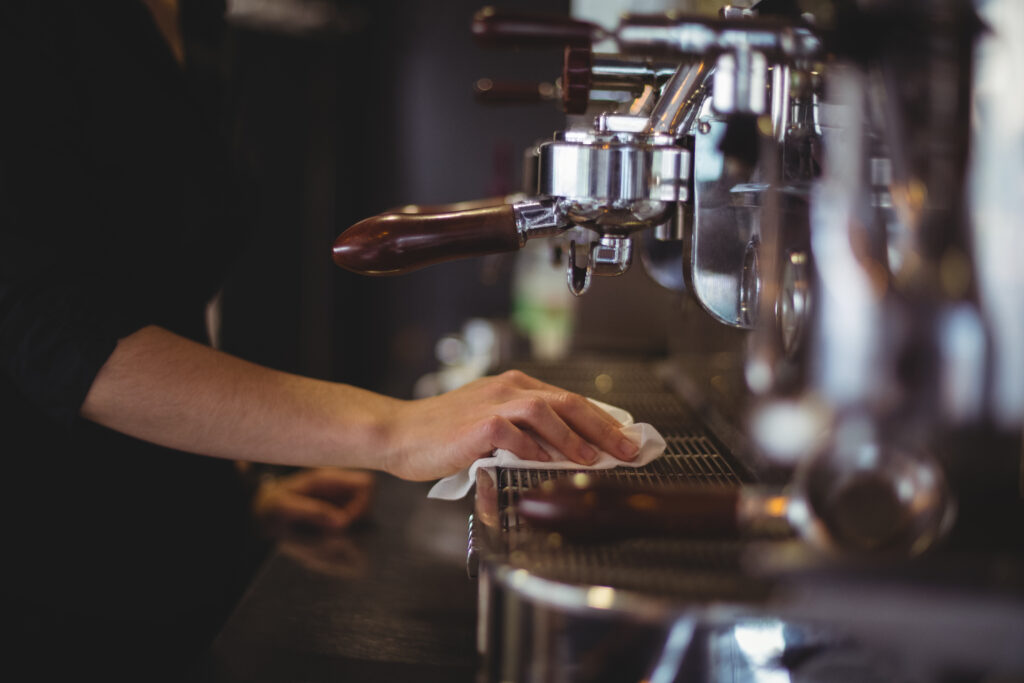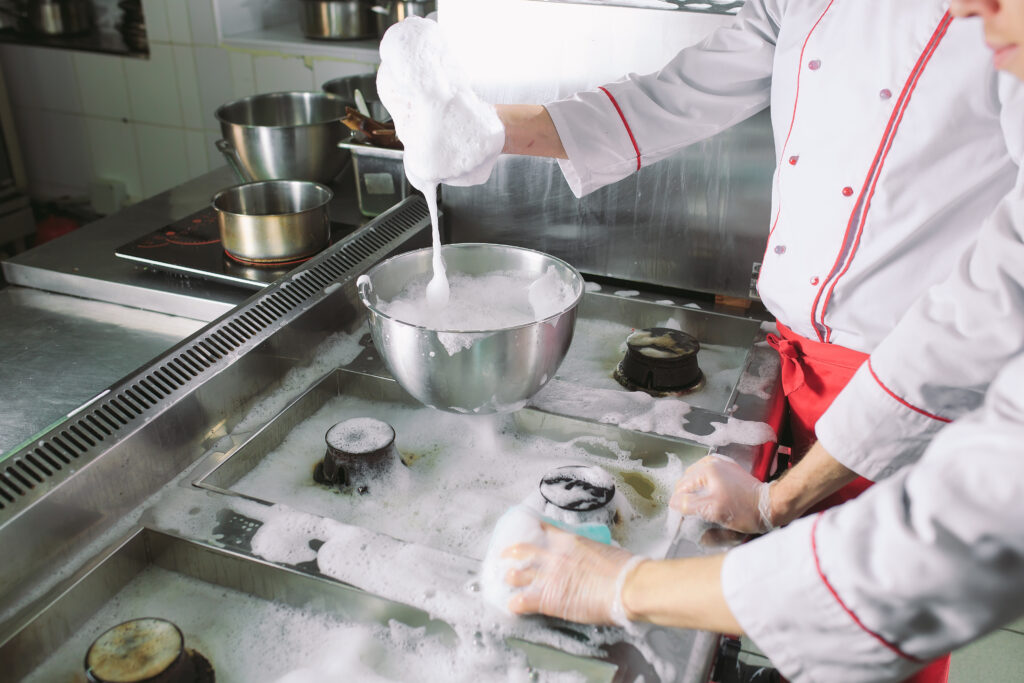
Keeping a commercial kitchen clean is vital to running a hospitality business. Food hygiene standards, regulated by the Food Standards Agency (FSA), are very high and you will need to satisfy the regulations in order to stay open.
Good food hygiene ensures that food is safe to eat, and it prevents the risk of food poisoning. As someone who runs or owns a commercial kitchen, you should introduce ways of working that will help ensure good food hygiene is a natural by-product of the process, and all staff members should be trained in this way of working.
Here’s what you need to know about commercial kitchen cleaning to stay on the right side of FSA regulations.
Preventing cross-contamination
Cross-contamination is the term for when bacteria are spread between food, surfaces, and equipment. It is most likely to happen when raw food touches or drips onto ready-to-eat food, equipment, or surfaces where food is prepared. For example, if raw meat drips onto a sandwich in the fridge, bacteria will spread from the meat to the sandwich and could cause food poisoning.
To prevent cross-contamination, you should thoroughly wash hands, surfaces, and equipment in between food preparation. Different foods should also be separated adequately, and colour coded equipment (knives and chopping boards particularly) used if necessary.
In fact, colour coding is one of the best ways of avoiding cross-contamination in kitchens. Other materials and equipment you should implement colour coding systems for include:
- Buckets and mops
- Brooms and brushes
- Cleaning cloths
- Dustpans and brushes
Along with colour coding cleaning equipment, take other precautions like keeping your supplies organised in locked cupboards to make sure they’re only used when required. Keeping cleaning chemicals in their original containers is also a good idea, to ensure that when it comes time to clean, you know you’re using the right solution.
Handwashing is also vital to preventing cross-contamination. Team members should wash their hands after handling raw meat or before switching sections in the kitchen. After raw meat has been prepared, equipment should be thoroughly washed ready for reuse later.
Cleaning

Food areas and equipment should be cleaned and disinfected between tasks, especially after handling raw meat. Team members should clean as they go, cleaning up spillages as they occur and removing bins as they fill up.
How often should you clean parts of the kitchen?
Kitchen area – Cleaning frequency
Surfaces – After each use
Utensils – After each use
Sinks – Throughout the day
Floors – Daily
Ovens – Weekly
Bins – Weekly
Fridges
and freezers – Monthly
Ventilation – 3 months to 1 year
Essential cleaning equipment for your commercial kitchen:
It’s important to equip any commercial kitchen with the type of equipment that you will need on a day-to-day basis, and keep it clean and ready for action at all times.
Equipment like cloths should be put in the washing machine daily alongside the other business laundry, with a ready supply close at hand. Mops should also be regularly cleaned. Between changing mop heads, the mop should be rinsed under a hot tap to remove excess food waste and dirt before it is next used.
Here are some of the most vital pieces of cleaning equipment for a commercial kitchen setting:
- Wheeled mop bucket
- Mop and spare mop heads
- Broom
- Dustpan and brush
- Microfibre cloths
- Cotton cleaning cloths
- Sponge scourers
- Industrial cleaning gloves
- Multipurpose, food-safe cleaner
- Floor cleaner
- Grill cleaning tools
How to deep clean a commercial kitchen?
It’s important to implement a comprehensive cleaning schedule so that each member of the kitchen team knows their duties come to the end of the day. This also creates accountability – no task should be signed off unless it is completed to a high standard. At the end of the day, the duty manager or head chef should check that everything has been cleaned to a high standard.
Before the shift
On entry into the kitchen at the beginning of a shift, the chef should wipe down all the surfaces with food-safe antibacterial cleaner and a clean cloth, clean sinks, and layout clean cloths and towels to be at hand during the shift. Then, they can start prepping food or cooking.
During the shift
Kitchen staff should build cleaning tasks into their daily routine, and whenever they get a quiet moment, should reach for a cloth or mop to keep their area tidy. Staying on top of the tasks throughout the day will mean that there is less to do after the shift ends.
They should:
- Remove grease build-ups and food debris on the grills
- Switch and clean cutting boards and knives
- Ensure the bin is emptied as it fills
- Clean spillage
At the end of the shift
The end of the shift means that it is time for an intensive clean, to remove the dirt and grease of the day. Staff members should use fresh cleaning cloths to deep clean and different cloths on different parts of the kitchen, to avoid cross-contamination. Many kitchens have moveable equipment so that every last inch of the floor can be easily cleaned.
Tasks include:
- Changing cleaning equipment
- Emptying and cleaning the deep fryers
- Cleaning the hobs and grills
- Removing dirty aprons and chefs’ whites, and setting them aside for laundry
- Covering, sealing, and refrigerating food
- Sweeping and mopping the floor
At the end of the week
Taking the time to deep clean appliances and equipment is particularly important, as is cleaning hard-to-reach spots where crumbs could accumulate. These tasks can have a direct impact on reducing the risk of infestation.
On a weekly basis:
- Clean out the fridge and sanitise it thoroughly
- Fryers should be deep cleaned
- Clean and sanitise shelves and cabinets
- Clean and sanitise glass wash and dish wash
- Clean and sanitise the bins
Following the advice provided in this commercial kitchen cleaning guide won’t just make your kitchen a cleaner, nicer place to work, it’ll also help to prevent any food safety and cross-contamination risks. That means better Food Standards Agency ratings, happier customers, and safer staff.